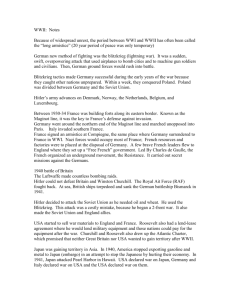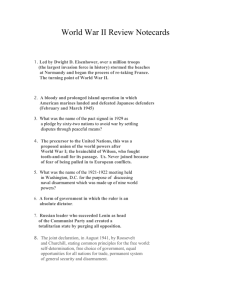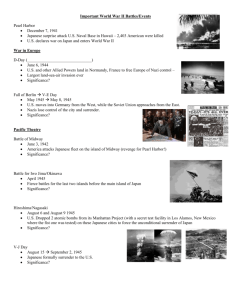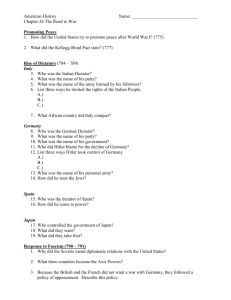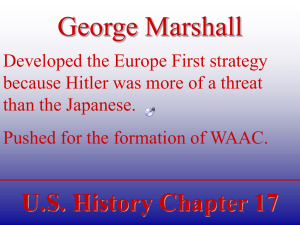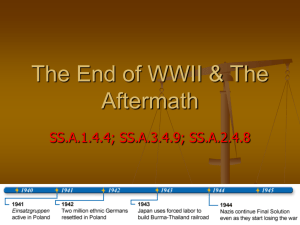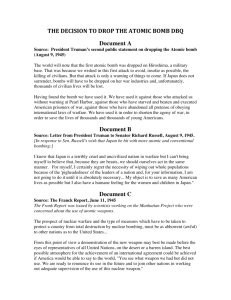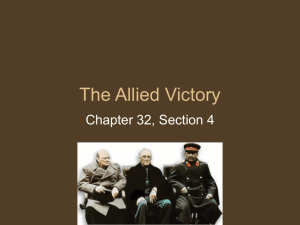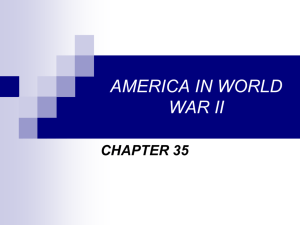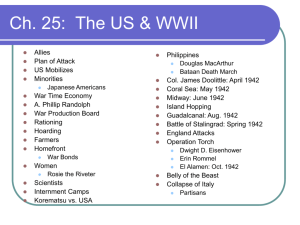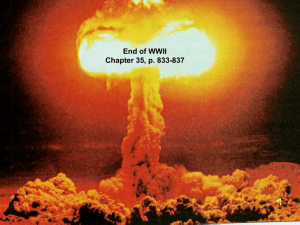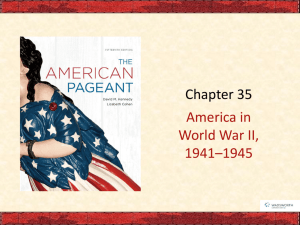CHAPTER 35: America in World War II - apush
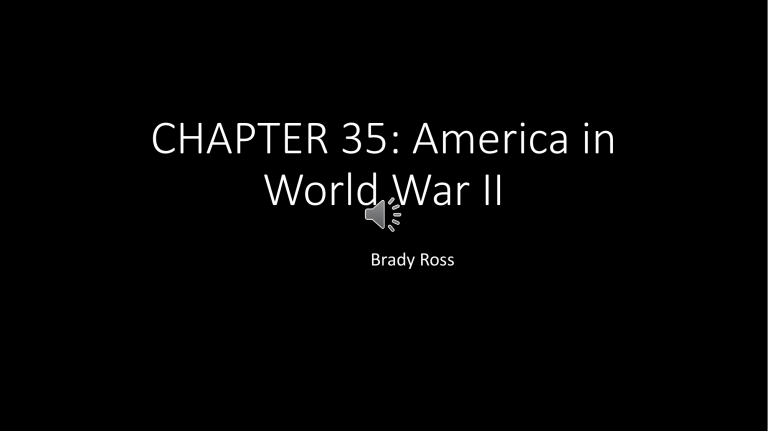
CHAPTER 35: America in
World War II
Brady Ross
• Made with Britain
• Adopted “Get Germany First” strategy
• Not well supported by American public.
• In order to win what the US needed most was time
• Overpowering problem America faced was to retool its self for all out war production, while hoping its allies would not meanwhile be crushed
• Time also important as Germans had skilled scientists
• America faced with more complex task than in WWI
-Had to clothe, feed, and arm itself, along with transport troops to far off regions
- Had to send food and munitions to allies
• Due to attack on Pearl Harbor by Japanese, national unity was no longer a worry as Americans now craved revenge.
• Millions of Italian Americans and German Americans gave the US their full loyal support to nations war program
-Unlike WWI where patriotism of immigrants were questioned
• WWII helped speed the assimilation of ethnic groups into American society
-Ethnic communities voters were crucial to FDR’s Democratic Party.
Shock of War continued…
• Exception was plight of around 110,000 Pacific coast Japanese
Americans who were put in concentration camps
• This precaution was authorized under…
Executive order No. 9066
• Camps deprived those imprisoned of basic rights, and they lost hundreds of millions of dollars in property and foregone earnings.
• Supreme Court upheld the constitutionality of the relocations in
Korematsu v. U.S.
More Shock of War
• Conservative Congress cancelled many New Deal programs
• FDR announced New Deal Era was over
• WWII not considered an idealistic crusade like WWI.
• War crisis completely ended the Great Depression
• Under the War Production Board (WPB), American factories began producing enormous amount of weaponry
• Henry J. Kaiser known for prodigies of ship construction
• WPB halted manufacture of nonessential items
• Japanese invasion of Malaya and Dutch East Indies snapped Americas supply of rubber
• Farmers increased output
War Machine Continued…
• Wonders of production brought economic strains
-Office of Price Administration helped control inflation
-National War Labor Board imposed ceilings on wage increases.
• Congress passed the Smith-Connally Anti-Stirke Act allowing Federal
Government to seize and operate tied up industries
• 1853 Matthew Perry’s arrival in Japan
• Within 20 years Japans new government launched nation toward industrialization and militarization
• As it modernized more citizens went to America
- 1885-1924 about 200,000 went to Hawaii and 180,000 went to mainland
• Most planned to stay temporarily
• Most went into farming
• 15 million men enlisted
• 216,000 women enlisted
• Best known: WAACs, WAVES, and SPARs
Continued…
• Draft left many farms and factories short of personnel
• Agreement made with Mexico in 1942
-Brought thousands of Mexican workers to America to harvest crops in West
Continued…
• Women helped fix factory worker shortage
-Over 6 million women took jobs outside the home
• Many continued work after the war ended
Continued…
• Impact on women’s lives exaggerated
• Most continued to work household traditional roles
• By wars end 2/3 of women left labor force
• Many men and women who served chose not return home at war’s end
• To help South’s economy, Southern states received a disproportionate share of defense contracts
• To monitor compliance with his executive order forbidding discrimination in defense industries, Roosevelt established…
Fair Employment Practices Commission
Continued…
• Blacks drafted but mainly assigned to service branches
• War did help blacks in struggle for equality
-NAACP membership increased to half a million
• Congress of Racial Equality founded in 1942
Continued…
• Invention of mechanical cotton picker accelerated African American migration Northward
- 5 million black tenant farmers and sharecroppers headed north
Continued…
• War prompted exodus of Native Americans from reservations
-Thousands found war work in cities
• 25,000 served in armed forces
• Comanches in Europe and Navajos in Pacific contributed as code talkers.
• Compared to other countries, the American homefront suffered little during the war
-War invigorated the economy and lifted country out of the
Great Depression
• Personal income doubled
• The war pointed the away toward the post-1945 era of biggovernment intervention
• Post-war economy continued to depend on military spending
Continued…
• World War II cost the US over $330 billion dollars
• Income tax expanded
• Maximum tax rates rose
• Most money was borreowed
• Debt rose from $49 billion (1941) to $259 billion (1945)
• Japanese needed to win quickly or lose slowly
• Launched widespread attacks on various eastern bastions
-Guam, Wake, and Philippines
• Cut the Burma Road
• Conquered the oil rich Dutch East Indies
• Captured General MacArthur’s troops in Bantaan
• Japanese pushed south and invaded New Guinea
-Stopped by naval battle fought in Coral Sea
• Japan attempted to seize Midway Island
• Admiral Raymond Spruance directed smaller carrier force
• Pivotal victory for the U.S.
-Halted Japanese expansion
• Victory at Midway allowed U.S. to seize the initiative in Pacific
• American forces gained ground in Guadalcanal Island
• Americans won with casualty ratio of 1 to 10
• General MacArthur conquered coast of New Guinea
• Navy used leapfrogging technique to capture Japanese held islands
• Prized islands were Marianas which allowed U.S. to deploy new B-29 superbombers on raids on Japanese home islands
• After assault on Marianas, Japanese Navy never recovered from their massive losses of planes, pilots and ships.
• Struggles also occurred in Atlantic
• In ten months over 500 ships reported lost
• Allied antisubmarine tactics improved when British code breakers broke Germans enigma codes allowing easier locating of U-boats
• By spring 1943 Allied forces had upper hand against U-Boat
• Turning point in land-air war came late 1942
-General Montgomery attacked El Alamein, driving enemy back to Tunisia
• Soviet Union also began having success
• By 1942 Soviet losses were already in the millions
• Many Americans wanted to start a divisionary invasion of France in
1942 or 43
• British military planners preferred to attack Hitler through the
Mediterranean
• Dwight D. Eisenhower led assault on French-held North Africa
• President Roosevelt and Winston Churchill met at Casablanca
-Agreed to step up Pacific war, invade Sicily, increase pressure on
Italy, and insist on “unconditional surrender”
Continued…
• Allied forces received Italy’s surrender in September 1943
• Germans continued to fight in Italy
• Itallian second front opened Mediterranean and diverted some
German troops from Soviet and French Battle lines
• Delayed main Allied invasion of Europe
• FDR, Winston Churchill, and Stalin met in Tehran from November 28 th to
December 1 st to discuss second front
-Most important achievement as agreement on broad plans
• U.S. gave the most troops for Allied invasion so Dwight D. Eisenhower was given command
• French Normandy chosen for point of invasion as it was less heavily defended than other parts of European coast
• On D-Day Allies broke through German defense and Gen George S Patton led armored divisions across France
• Most important German city to Fall was Aachen, leaving Hitler with a numbered amount of days left
• For election of 1944 republicans nominated Thomas E. Dewey for
President and John W. Bricker as Vice President
• Democrats nominated Roosevelt
Who ran as the vice presidential nominee for the Democrats?
Harry Truman
Continued…
• Roosevelt won thanks to war going well
• Roosevelt’s experience with foreign policy was needed to make future world peace
• Republican party was still suffering from taint of isolationism
• As Germany was weakening Hitler threw all his forces into the thinly held American lines in the Ardennes Forest
-Attempting to take Belgian port of Antwerp, the key to Allied supply operation
• In Battle of the Bulge Allies were driven back
• 10 day German push stopped by 101 st Airborne Division led by
Brigadier General A. C. McAuliffe
• April 1945, U.S. troops continued into Germany discovering concentration camps
-Nazis murdered over 6 million Jews
Continued…
• Soviets captured Berlin in April 1945
• Hitler committed suicide on April 30 th 1945
• April 12 th 1945 Roosevelt dies suddenly from…?
A brain hemorrhage
• Harry Truman takes over Presidency
• May 7 th 1945 German government surrenders unconditionally
• Severe damage was inflicted on Japan by submarines and bombers
-Destroyed about 50% of Japan’s merchant fleet
• Firebombings killed over 83,000 people
• General MacArthur returned to Philippines with 600 ships, defeating
Japan in a series of 3 battles in the Leyte Gulf, marking the end of
Japan’s sea power
• Iwo Jima was captured in March 1945
• Okinawa was captured in June 1945
• What is the name of Japanese suicide pilots who would crash into navy ships?
Kamikazes
• Japan was not willing to surrender unconditionally
• At the Potsdam conference in July 1945, the U.S., British, and Russians issued an ultimatum to Japan: Surrender or be destroyed
• The Manhattan Project developed the first atomic bomb
• July 16 th 1945 first bomb detonated as a test, Japanese still didn’t surrender
• August 6 th 1945 atomic bomb dropped on Hiroshima, killing 180,000
• August 8 th Stalin invaded defenses of Manchuria and Korea
• Japan still wouldn’t surrender
• August 9 th Atomic bomb dropped on Nagasaki killing 80,000
Continued…
• U.S. would have more atomic bombs ready to drop in the coming weeks
• August 10 th 1945 Tokyo surrendered under condition that their emperor Hirohito could keep title
• August 14 th 1945 Allies accept that condition
• September 2 nd 1945 formal end to war
• Americans suffered 1 million casualties
-Proportion killed by wounds and disease reduced
• Soviet Union suffered 25 million casualties
• Much of the world had been destroyed while America basically wasn’t touched
• U.S. was more prepared for war than any other country as it had begun preparing about a year and a half before it actually entered the war
• Americans had great leadership and industrial strength
• United States and Germany were hardest hit by Great Depression
• Roosevelt was coaxing legislation out of the Hundred Days Congress while Hitler was dissolving labor unions and censoring the press
• Roosevelt worried about his political challenge while Hitler had his executed
• Americans can count their blessings that they didn’t experience some of the horrors faced elsewhere
• Usage of atomic bombs is the most controversial topic of WWII
• Some critics accuse U.S. of racist motives
• Some believe it was unnecessary
• Gar Alpeovitz believed it was the salvos in the emerging cold war
• Martin J. Sherwin, Barton J. Bernstein and McGeorge Bundy have shown few policy makers at the time asked the question on whether the bombs could have been avoided
